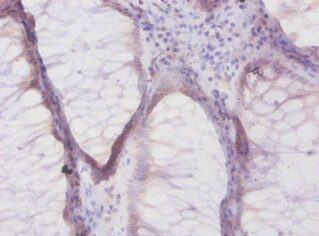Defensins form a family of microbicidal and cytotoxic peptides made by neutrophils. Members of the defensin family are highly similar in protein sequence. This gene encodes defensin, beta 1, an antimicrobial peptide implicated in the resistance of epithelial surfaces to microbial colonization. This gene maps in close proximity to defensin family member, defensin, alpha 1 and has been implicated in the pathogenesis of cystic fibrosis. The mature form of Beta-defensin 1 is 36 amino acids. Beta-defensins (also designated BD, and hBD in human) are small cationic peptides with broad-spectrum antimicrobial activity. Produced in mucosal epithelia and neutrophils of several species, Beta-defensins are developmentally regulated. Research indicates that human Beta-defensin 1 may contribute to the antimicrobial activity of airway surface fluid and may play a role in the mucosal defenses of the lung. Human β-defensin 1 shares homology with other Beta-defensins from human blood filtrate and is also present in nanomolar concentrations in human plasma. In addition to the antimicrobial activity of human airway epithelia, Beta-defensin 1 may play a role in the mucosal defenses of the lung.
Clone
Polyclonal
Isotype
IgG
Host species
Rabbit
Species Reactivity
Human
Cellular Localization
Secreted
Positive Control
Kidney, colon cancer
Applications
IF, IHC
Intended Use
Research Use Only

